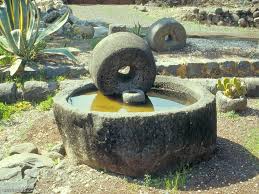
“Gethsemane” means olive press. The film shows an image of an ancient olive press at Capernaum. The olive press symbolizes the crucifixion.
There is a synagogue in Capernaum from the 3rd or 4th century, which is likely along the same plans as was used in the First Century.
Jesus was asked to heal a centurion’s servant. The centurion had built the synagogue and was highly esteemed by the people.
(Luke 7:2-5) There a centurion’s servant, whom his master valued highly, was sick and about to die. 3 The centurion heard of Jesus and sent some elders of the Jews to him, asking him to come and heal his servant. 4 When they came to Jesus, they pleaded earnestly with him, “This man deserves to have you do this, 5 because he loves our nation and has built our synagogue.”
Jesus was amazed at the faith of the centurion.
In Matthew 11, Jesus pronounces a curse on Capernaum for failing to repent.
(Mat 11:20-23) Then Jesus began to denounce the cities in which most of his miracles had been performed, because they did not repent. 21 “Woe to you, Korazin! Woe to you, Bethsaida! If the miracles that were performed in you had been performed in Tyre and Sidon, they would have repented long ago in sackcloth and ashes. 22 But I tell you, it will be more bearable for Tyre and Sidon on the day of judgment than for you. 23 And you, Capernaum, will you be lifted up to the skies? No, you will go down to the depths. If the miracles that were performed in you had been performed in Sodom, it would have remained to this day.
RVL: We’ve been taught the miracles of Jesus. Therefore, we will have no excuse. The most severe curses in the Bible are against those who knew better — not those who sinned in ignorance.
 Olive oil was used for lubricant, for fuel, for lamps, for cleaning, as a preservative, and in cooking. Olive oil production was a major industry.
Olive oil was used for lubricant, for fuel, for lamps, for cleaning, as a preservative, and in cooking. Olive oil production was a major industry.
A massive stone rolled over the olives to produce olive oil. The crushed olives were then placed in another container and a massive stone column crushed the rest of the oil out of them. The olives were repeatedly crushed to get all the oil out.
Only the wealthy, typically the aristocrats, could afford the equipment needed to press the olives, and so they had control over local agriculture.
The Messiah is the “annointed one,” which refers to annointing with oil — olive oil.
Every few hundred years, an olive tree will stop bearing fruit and so must be cut down, and a new tree will grow from the stump.
(Isa 11:1) A shoot will come up from the stump of Jesse; from his roots a Branch will bear fruit.
The Jews taught that the new “shoot” was the Messiah — the shoot or branch out of Jesse.
Paul teaches that the Gentiles are grafted into the stump, meaning that out roots are Jewish.
And if God will cut down the natural tree for not bearing fruit, what will he do with the grafted-in tree?
“Nazareth” means shoot. Hence, Jesus is from “shoot” or “branch.”
Parents of children brought children to be blessed by the rabbi Jesus. Jesus insisted that the children come.
(Mat 18:2-6) He called a little child and had him stand among them. 3 And he said: “I tell you the truth, unless you change and become like little children, you will never enter the kingdom of heaven. 4 Therefore, whoever humbles himself like this child is the greatest in the kingdom of heaven.
5 “And whoever welcomes a little child like this in my name welcomes me. 6 But if anyone causes one of these little ones who believe in me to sin, it would be better for him to have a large millstone hung around his neck and to be drowned in the depths of the sea.
Children had no status in that culture. To become like a child was to give up status and rights.
Jesus felt strongly about those without status, who are unimportant. These are the “little ones.” If we don’t care about the little ones, the unimportant, the unloved, we’ll be tossed into the Abyss with a millstone (from an olive press) tied around our necks.
 The column or pillar of stone used to squeeze the last of the oil out of a crushed olive was a “geth semane.” After telling the disciples to take on the gates of hell, he led them to Jerusalem, and then he went to the Garden of the Olive Press. There he felt the weight of the olive pressed — to the point of sweating blood.
The column or pillar of stone used to squeeze the last of the oil out of a crushed olive was a “geth semane.” After telling the disciples to take on the gates of hell, he led them to Jerusalem, and then he went to the Garden of the Olive Press. There he felt the weight of the olive pressed — to the point of sweating blood.
The burden of carrying our sins was enormous. The “olives” are Jesus. The “weight” is us — we are the weight that squeezed the blood out of Jesus.





Praise God for all He is doing. Thanks!